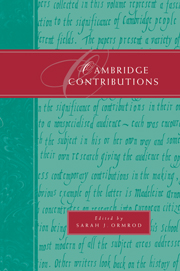Book contents
- Frontmatter
- Contents
- Notes on contributors and contributions
- Preface
- 1 Some Cambridge contributions to astronomy and cosmology
- 2 Cambridge's contribution to medical science
- 3 Cambridge and the study of English
- 4 The Cambridge contribution to economics
- 5 ‘Nasty forward minxes’: Cambridge and the higher education of women
- 6 Cambridge Classics for the third millennium
- 7 Cambridge contributions: the philosophy of science
- 8 European citizenship and education
- 9 The University Botanic Garden
- 10 Geophysics in Cambridge: extinct and active volcanoes
- 11 Cambridge spies: the ‘Magnificent Five’, 1933–1945
2 - Cambridge's contribution to medical science
Published online by Cambridge University Press: 31 December 2009
- Frontmatter
- Contents
- Notes on contributors and contributions
- Preface
- 1 Some Cambridge contributions to astronomy and cosmology
- 2 Cambridge's contribution to medical science
- 3 Cambridge and the study of English
- 4 The Cambridge contribution to economics
- 5 ‘Nasty forward minxes’: Cambridge and the higher education of women
- 6 Cambridge Classics for the third millennium
- 7 Cambridge contributions: the philosophy of science
- 8 European citizenship and education
- 9 The University Botanic Garden
- 10 Geophysics in Cambridge: extinct and active volcanoes
- 11 Cambridge spies: the ‘Magnificent Five’, 1933–1945
Summary
INTRODUCTION
If my task was to outline Cambridge's contribution to medical practice, then it would be most appropriate to concentrate on the University's role in medical education. Medical degrees have been granted at Cambridge for over 700 years, and a steady trickle of students - increasing in the last century to something approaching a flood - has come to Cambridge to be taught the rudiments of medicine, before leaving for London, Edinburgh, or one of the great continental schools where they could see more patients on the wards of their larger hospitals. (In fact at the end of the last century, and again since 1976, Cambridge itself has provided the facilities for students' clinical education.) After several years the students would return and take their viva voce examination for the Doctorate of Medicine.
In the past the University's critics held a very poor opinion of the Cambridge-educated physician. Not even the most elevated members of the faculty were immune from criticism: Isaac Pennington, for example, Regius Professor of Physic from 1793 to 1817, began his professorial career as Professor of Chemistry, but quite clearly knew little chemistry and didn't deliver any lectures. Naturally, therefore, he was promoted to the Chair of Medicine, about which he ought to have known a little bit more, being physician to Addenbrooke's Hospital.
- Type
- Chapter
- Information
- Cambridge Contributions , pp. 21 - 41Publisher: Cambridge University PressPrint publication year: 1998



